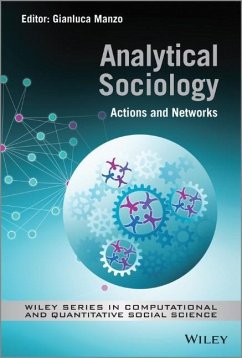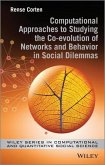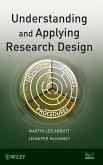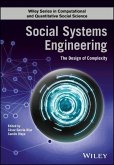Analytical Sociology
Actions and Networks
Herausgegeben von Manzo, Gianluca
Analytical Sociology
Actions and Networks
Herausgegeben von Manzo, Gianluca
- Gebundenes Buch
- Merkliste
- Auf die Merkliste
- Bewerten Bewerten
- Teilen
- Produkt teilen
- Produkterinnerung
- Produkterinnerung
This book illustrates how analytical sociology is progressively refining its theoretical framework and how powerful this framework is in explaining a large array of social phenomena. The authors have collaborated to demonstrate how analytical sociology integrates formal models, computer simulations, laboratory experiments, and complex statistical analysis of large-scale datasets. This integration makes analytical sociology comparable to the methodology adopted by modern biological and physical sciences. The authors discuss computational models as well as laboratory experiments, focusing on how…mehr
Andere Kunden interessierten sich auch für
![Agent-Based Computational Sociology Agent-Based Computational Sociology]() Flaminio SquazzoniAgent-Based Computational Sociology88,99 €
Flaminio SquazzoniAgent-Based Computational Sociology88,99 €![Computational Approaches to Studying the Co-Evolution of Networks and Behavior in Social Dilemmas Computational Approaches to Studying the Co-Evolution of Networks and Behavior in Social Dilemmas]() Rense CortenComputational Approaches to Studying the Co-Evolution of Networks and Behavior in Social Dilemmas86,99 €
Rense CortenComputational Approaches to Studying the Co-Evolution of Networks and Behavior in Social Dilemmas86,99 €![Agent-Based Modelling in Economics Agent-Based Modelling in Economics]() Lynne HamillAgent-Based Modelling in Economics73,99 €
Lynne HamillAgent-Based Modelling in Economics73,99 €![Causality Causality]() Guanglei HongCausality100,99 €
Guanglei HongCausality100,99 €![Understanding and Applying Research Design Understanding and Applying Research Design]() Martin Lee AbbottUnderstanding and Applying Research Design143,99 €
Martin Lee AbbottUnderstanding and Applying Research Design143,99 €![The Wellbeing of Nations The Wellbeing of Nations]() Paul AllinThe Wellbeing of Nations79,99 €
Paul AllinThe Wellbeing of Nations79,99 €![Social Systems Engineering Social Systems Engineering]() Social Systems Engineering114,99 €
Social Systems Engineering114,99 €-
-
-
This book illustrates how analytical sociology is progressively refining its theoretical framework and how powerful this framework is in explaining a large array of social phenomena. The authors have collaborated to demonstrate how analytical sociology integrates formal models, computer simulations, laboratory experiments, and complex statistical analysis of large-scale datasets. This integration makes analytical sociology comparable to the methodology adopted by modern biological and physical sciences. The authors discuss computational models as well as laboratory experiments, focusing on how experiments may shed light on the complex relation between norms, networks, and social actions.
Demonstrates the power of the theoretical framework of analytical sociology in
explaining a large array of social phenomena
Analytical Sociology: Actions and Networks presents the most advanced theoretical discussion of analytical sociology, along with a unique set of examples on mechanism-
based sociology. Leading scholars apply the theoretical principles of analytical sociology
to understand how puzzling social and historical phenomena including crime, lynching,
witch-hunts, tax behaviours, Web-based social movement and communication,
restaurant reputation, job search and careers, social network homophily and instability, cooperation and trust are brought about by complex, multi-layered social mechanisms. The analyses presented in this book rely on a wide range of methods which include qualitative observations, advanced statistical techniques, complex network tools, refined simulation methods and creative experimental protocols.
This book ultimately demonstrates that sociology, like any other science, is at its best
when it dissects the mechanisms at work by means of rigorous model building and testing.
Analytical Sociology:
Provides the most complete and up-to-date theoretical treatment of analytical sociology.
Looks at a wide range of complex social phenomena within a single and unitary theoretical framework.
Explores a variety of advanced methods to build and test theoretical models.
Examines how both computational modelling and experiments can be used
to study the complex relation between norms, networks and social actions.
Brings together research from leading global experts in the field in order to
present a unique set of examples on mechanism-based sociology.
Advanced graduate students and researchers working in sociology, methodology of social sciences, statistics, social networks analysis and computer simulation will benefit from this book.
Demonstrates the power of the theoretical framework of analytical sociology in
explaining a large array of social phenomena
Analytical Sociology: Actions and Networks presents the most advanced theoretical discussion of analytical sociology, along with a unique set of examples on mechanism-
based sociology. Leading scholars apply the theoretical principles of analytical sociology
to understand how puzzling social and historical phenomena including crime, lynching,
witch-hunts, tax behaviours, Web-based social movement and communication,
restaurant reputation, job search and careers, social network homophily and instability, cooperation and trust are brought about by complex, multi-layered social mechanisms. The analyses presented in this book rely on a wide range of methods which include qualitative observations, advanced statistical techniques, complex network tools, refined simulation methods and creative experimental protocols.
This book ultimately demonstrates that sociology, like any other science, is at its best
when it dissects the mechanisms at work by means of rigorous model building and testing.
Analytical Sociology:
Provides the most complete and up-to-date theoretical treatment of analytical sociology.
Looks at a wide range of complex social phenomena within a single and unitary theoretical framework.
Explores a variety of advanced methods to build and test theoretical models.
Examines how both computational modelling and experiments can be used
to study the complex relation between norms, networks and social actions.
Brings together research from leading global experts in the field in order to
present a unique set of examples on mechanism-based sociology.
Advanced graduate students and researchers working in sociology, methodology of social sciences, statistics, social networks analysis and computer simulation will benefit from this book.
Produktdetails
- Produktdetails
- Wiley Series in Computational and Quantitative Social Science
- Verlag: Wiley & Sons
- 1. Auflage
- Seitenzahl: 448
- Erscheinungstermin: 5. Mai 2014
- Englisch
- Abmessung: 251mm x 172mm x 27mm
- Gewicht: 834g
- ISBN-13: 9781119940388
- ISBN-10: 1119940389
- Artikelnr.: 39367391
- Wiley Series in Computational and Quantitative Social Science
- Verlag: Wiley & Sons
- 1. Auflage
- Seitenzahl: 448
- Erscheinungstermin: 5. Mai 2014
- Englisch
- Abmessung: 251mm x 172mm x 27mm
- Gewicht: 834g
- ISBN-13: 9781119940388
- ISBN-10: 1119940389
- Artikelnr.: 39367391
Editor: Gianluca Manzo GEMASS, Centre National de la Recherche Scientifique (CNRS) and University of Paris-Sorbonne, France
Preface and Acknowledgments xiii About the Editor xv List of Contributors
xvii Introduction 1 Editor's Introduction to Chapter 1 2 1 Data, Generative
Models, and Mechanisms: More on the Principles of Analytical Sociology 4
Gianluca Manzo 1.1 Introduction 4 1.2 The Principles of Analytical
Sociology 7 1.3 Clarity (P1) 10 1.4 Description (P2) 12 1.5 Generative
Models (P3) 14 1.6 Structural Methodological Individualism (P4a) 17 1.7
Logics of Action (P4b) 21 1.8 Structural Interdependency (P4c) 27 1.9
Agent-Based Modeling (P5) 29 1.10 Back to Data (P6 and P7) 35 1.11
Concluding Remarks 37 1.12 How to Read this Book 40 Part I ACTIONS 53
Foundational Issues 54 Editor's Introduction to Chapter 2 55 2 Analytical
Sociology and Rational-Choice Theory 57 Peter Hedström and Petri Ylikoski
2.1 Rational-Choice Theory 58 2.2 Sociological Rational-Choice Theory 59
2.3 Analytical Sociology as a Meta-Theory 60 2.4 The Key Ideas of
Analytical Sociology 61 2.4.1 Mechanism-Based Explanation 61 2.4.2 Realism
62 2.4.3 Theories of Middle Range 63 2.4.4 Theory of Action 64 2.5 The
Puzzle 64 2.6 The Assumed Special Role of RCT 65 2.7 Conclusion 67 3 Why
Crime Happens: A Situational Action Theory 74 Per-Olof H. Wikström 3.1
Situational Action Theory 75 3.2 Explaining Crime 76 3.3 The Situational
Model 77 3.4 The Situational Process 78 3.4.1 Motivation 79 3.4.2
Perception of Action Alternatives: The Moral Filter 80 3.4.3 The Process of
Choice: Habits and Deliberation 80 3.4.4 Controls: Self-Control and
Deterrence 82 3.5 The Social Model 82 3.6 Integrating the Social and
Situational Models 84 3.7 Testing SAT 85 3.7.1 The Peterborough Adolescent
and Young Adult Development Study 85 3.7.2 Measuring Crime, Crime
Propensity and Criminogenic Exposure 86 3.7.3 Crime Involvement by Crime
Propensity and Criminogenic Exposure 87 3.7.4 The Impact of Criminogenic
Exposure on Crime for Groups with Different Levels of Crime Propensity 88
3.8 Explaining Crime Concentrations (Hot Spots) 90 3.9 Coda 92 4 Frames,
Scripts, and Variable Rationality: An Integrative Theory of Action 97
Clemens Kroneberg 4.1 Introduction 97 4.2 The Model of Frame Selection
(MFS) 99 4.2.1 Frames, Scripts, and Actions 99 4.2.2 Dual-processes:
Spontaneous vs. Reflected Modes of Selection 100 4.2.3 The Determinants of
Variable Rationality 104 4.3 Hypotheses and Previous Applications 106 4.4
An Exemplary Application Using Survey Data: Explaining Voter Participation
108 4.4.1 Theory 108 4.4.2 Data and Measures 112 4.4.3 Results 113 4.5
Applying the MFS to Study Social Dynamics 115 4.5.1 The MFS and the Study
of Social Movements and Collective Action 116 4.5.2 Strategic Interaction
with Variable Rationality and Framing 117 4.6 Conclusion 118 5 Analytical
Sociology and Quantitative Narrative Analysis: Explaining Lynchings in
Georgia (1875-1930) 127 Roberto Franzosi 5.1 Strange Fruits on Southern
Trees 127 5.2 Analytical Sociology 128 5.3 Quantitative Narrative Analysis
(QNA) 129 5.3.1 Step 1: Story Grammars 130 5.3.2 Step 2: PC-ACE (Program
for Computer-Assisted Coding of Events) 132 5.3.3 Step 3: Data Analysis:
Actor-Centered vs. Variable-Centered Tools of Analysis 134 5.4 Of Sequences
139 5.5 Of Time and Space 142 5.6 Conclusions 144 6 Identity and
Opportunity in Early Modern Politics: How Job Vacancies Induced Witch
Persecutions in Scotland, 1563-1736 151 Anna Mitschele 6.1 Introduction 151
6.2 Theories about Witches and Research on State Making 153 6.3 Towards a
Theory of Persecution 155 6.3.1 Communities 156 6.3.2 Elite Social
Structure and Government 157 6.4 Witch-Hunting in Scotland 157 6.5 Findings
159 6.5.1 Prosecution as Career Device I: Waves of Witch-Hunting and their
Historical Correlates 159 6.5.2 Prosecution as Career Device II:
Witch-Hunters Become Justices of the Peace 161 6.5.3 Competing Explanations
I: The Godly State Ideology 162 6.5.4 Competing Explanations II: Witches as
Scapegoats for Disaster 163 6.6 Discussion 164 7 Mechanisms of Cooperation
172 Davide Barrera 7.1 Introduction 172 7.2 Cooperation Problems in Dyadic
Settings 174 7.2.1 Models of Trust Problem 175 7.2.2 Cooperation Mechanisms
in Embedded Settings 178 7.2.3 Empirical Research on Trust in Embedded
Settings 179 7.2.4 Dyadic Embeddedness 180 7.2.5 Network Embeddedness 180
7.3 Cooperation Problems Involving More than Two Actors 181 7.3.1
Reciprocity and Non-Standard Utility Models 183 7.3.2 Empirical Evidence on
Heterogeneous Preferences 184 7.4 Discussion and Concluding Remarks 187 8
The Impact of Elections on Cooperation: Evidence from a Lab-in-the-Field
Experiment in Uganda 201 Guy Grossman and Delia Baldassarri 8.1 Theoretical
Framework and Hypotheses 203 8.2 Research Site, Sampling, and Experimental
Design 206 8.3 Research Site 207 8.4 Sampling and Data Collection 208 8.5
Experimental Design 208 8.6 Experimental Findings 210 8.7 Monitors'
Sanctioning Behavior 214 8.8 Discussion of the Experimental Part 216 8.9
Observational Data 217 8.10 Comparing Behavior in the Experiment and Real
Life 219 8.11 Conclusion 221 Part II NETWORKS 233 Collective Action 234
Editor's Introduction to Chapter 9 235 9 Social Networks and Agent-Based
Modelling 237 Meredith Rolfe 9.1 Social Network Properties 238 9.1.1
Surveys of Personal Networks 239 9.2 Network Construction Techniques 243
9.2.1 Global Reference or Full Information 243 9.2.2 Random Graph Local
Networks 243 9.2.3 Two-Dimensional Lattices or Grid-Based Networks 244
9.2.4 One-Dimensional Lattice or Small-World Method 245 9.2.5 Biased or
Structured Random Networks 245 9.3 Networks as Pipes: A Basic Demonstration
246 9.3.1 Global Networks and Group Size 248 9.3.2 Results with Network
Construction Methods 251 9.4 Discussion 256 10 Online Networks and the
Diffusion of Protest 263 Sandra Gonzalez-Bailón, Javier Borge-Holthoefer,
and Yamir Moreno 10.1 Diffusion Dynamics 264 10.1.1 Models of Diffusion 264
10.1.2 Case Study 266 10.2 Thresholds and Critical Mass 268 10.3 Networks
and Social Influence 271 10.4 Conclusion: Digital Data and Analytical
Sociology 275 11 Liability to Rupture: Multiple Mechanisms and Subgroup
Formation. An Exploratory Theoretical Study 282 Peter Abell 11.1
Introduction 282 11.2 A Formal Framework 283 11.3 Balance Theory 284 11.4
Homophily (H-theory) 287 11.5 Baseline Structures 288 11.6 Developing a
Dynamic Mechanism for Balance Theory 289 11.7 Developing a Dynamic
Mechanism for H-theory 291 11.8 The Dynamic Interaction of Balance and
H-theories 293 11.9 Conclusions 294 12 Network Size and Network Homophily:
Same-Sex Friendships in 595 Scandinavian Schools 299 Thomas Grund 12.1
Introduction 299 12.2 Theoretical Considerations 301 12.2.1 Biased Urn
Model Without Replacement for Network Formation 301 12.2.2 Role of Group
Size for Homophily 305 12.3 Empirical Application: Same-Sex Ties in School
Classes 308 12.3.1 Hypotheses 308 12.3.2 Data and Method 309 12.4 Results
310 12.5 Conclusion 312 13 Status and Participation in Online Task Groups:
An Agent-Based Model 317 Simone Gabbriellini 13.1 Introduction 317 13.2
Previous Models 319 13.3 E-state Structuralism: A Very Brief Review with an
Add-On 321 13.4 Case Study: Strategies and Discussions in Massively
Multi-Player Online Games 324 13.5 Analysis of the Model 326 13.6 Empirical
Test/Validation of the Model 331 13.7 Conclusions 336 14 Turbulent Careers:
Social Networks, Employer Hiring Preferences, and Job Instability 342
Christine Fountain and Katherine Stovel 14.1 Introduction 342 14.2
Background 343 14.2.1 The Rise of Turbulence in Individual Employment
Trajectories 343 14.2.2 Inequality in Insecurity 344 14.3 Networks 346
14.3.1 Network Structure and Inequality in Information 346 14.3.2 Our
Approach 348 14.4 Methods 349 14.4.1 The Simulation Environment 349 14.4.2
Implementation 350 14.4.3 Experimental Structure 353 14.5 Results 355 14.6
Summary and Conclusions 362 15 Employer Networks, Priming, and
Discrimination in Hiring: An Experiment 373 Karoly Takacs, Flaminio
Squazzoni, Giangiacomo Bravo, and Marco Castellani 15.1 Introduction 373
15.2 Method 376 15.2.1 Experimental Design 376 15.2.2 Manipulations 378
15.2.3 Subjects 378 15.3 Results 379 15.3.1 Index Values 379 15.3.2
Hierarchical Models 382 15.3.3 From Traditional Testing Toward Finding
Indicators for Mechanisms 385 15.4 Discussion 391 16 The Duality of
Organizations and Audiences 400 Balazs Kovacs 16.1 Introduction 400 16.2
Similarity and the Duality of Organizations and their Audiences 401 16.3
Organizational Similarity, Audiences, and Arguments for Extending
Structural Equivalence 403 16.4 A Representation for Dual Similarity of
Organizations and their Audiences 406 16.5 Empirical Illustration: The
Duality of Restaurants and their Reviewers 407 16.6 Similarity as a Basis
for Prediction: Validating the Model 408 16.7 Discussion, Implications, and
Limitations 412 16.8 Connections to Analytical Sociology 415 References 415
Further Reading 418 Coda 419 Problem Shift in Sociology: Mechanisms,
Generic Instruments, and Fractals 420 Gianluca Manzo Index 427
xvii Introduction 1 Editor's Introduction to Chapter 1 2 1 Data, Generative
Models, and Mechanisms: More on the Principles of Analytical Sociology 4
Gianluca Manzo 1.1 Introduction 4 1.2 The Principles of Analytical
Sociology 7 1.3 Clarity (P1) 10 1.4 Description (P2) 12 1.5 Generative
Models (P3) 14 1.6 Structural Methodological Individualism (P4a) 17 1.7
Logics of Action (P4b) 21 1.8 Structural Interdependency (P4c) 27 1.9
Agent-Based Modeling (P5) 29 1.10 Back to Data (P6 and P7) 35 1.11
Concluding Remarks 37 1.12 How to Read this Book 40 Part I ACTIONS 53
Foundational Issues 54 Editor's Introduction to Chapter 2 55 2 Analytical
Sociology and Rational-Choice Theory 57 Peter Hedström and Petri Ylikoski
2.1 Rational-Choice Theory 58 2.2 Sociological Rational-Choice Theory 59
2.3 Analytical Sociology as a Meta-Theory 60 2.4 The Key Ideas of
Analytical Sociology 61 2.4.1 Mechanism-Based Explanation 61 2.4.2 Realism
62 2.4.3 Theories of Middle Range 63 2.4.4 Theory of Action 64 2.5 The
Puzzle 64 2.6 The Assumed Special Role of RCT 65 2.7 Conclusion 67 3 Why
Crime Happens: A Situational Action Theory 74 Per-Olof H. Wikström 3.1
Situational Action Theory 75 3.2 Explaining Crime 76 3.3 The Situational
Model 77 3.4 The Situational Process 78 3.4.1 Motivation 79 3.4.2
Perception of Action Alternatives: The Moral Filter 80 3.4.3 The Process of
Choice: Habits and Deliberation 80 3.4.4 Controls: Self-Control and
Deterrence 82 3.5 The Social Model 82 3.6 Integrating the Social and
Situational Models 84 3.7 Testing SAT 85 3.7.1 The Peterborough Adolescent
and Young Adult Development Study 85 3.7.2 Measuring Crime, Crime
Propensity and Criminogenic Exposure 86 3.7.3 Crime Involvement by Crime
Propensity and Criminogenic Exposure 87 3.7.4 The Impact of Criminogenic
Exposure on Crime for Groups with Different Levels of Crime Propensity 88
3.8 Explaining Crime Concentrations (Hot Spots) 90 3.9 Coda 92 4 Frames,
Scripts, and Variable Rationality: An Integrative Theory of Action 97
Clemens Kroneberg 4.1 Introduction 97 4.2 The Model of Frame Selection
(MFS) 99 4.2.1 Frames, Scripts, and Actions 99 4.2.2 Dual-processes:
Spontaneous vs. Reflected Modes of Selection 100 4.2.3 The Determinants of
Variable Rationality 104 4.3 Hypotheses and Previous Applications 106 4.4
An Exemplary Application Using Survey Data: Explaining Voter Participation
108 4.4.1 Theory 108 4.4.2 Data and Measures 112 4.4.3 Results 113 4.5
Applying the MFS to Study Social Dynamics 115 4.5.1 The MFS and the Study
of Social Movements and Collective Action 116 4.5.2 Strategic Interaction
with Variable Rationality and Framing 117 4.6 Conclusion 118 5 Analytical
Sociology and Quantitative Narrative Analysis: Explaining Lynchings in
Georgia (1875-1930) 127 Roberto Franzosi 5.1 Strange Fruits on Southern
Trees 127 5.2 Analytical Sociology 128 5.3 Quantitative Narrative Analysis
(QNA) 129 5.3.1 Step 1: Story Grammars 130 5.3.2 Step 2: PC-ACE (Program
for Computer-Assisted Coding of Events) 132 5.3.3 Step 3: Data Analysis:
Actor-Centered vs. Variable-Centered Tools of Analysis 134 5.4 Of Sequences
139 5.5 Of Time and Space 142 5.6 Conclusions 144 6 Identity and
Opportunity in Early Modern Politics: How Job Vacancies Induced Witch
Persecutions in Scotland, 1563-1736 151 Anna Mitschele 6.1 Introduction 151
6.2 Theories about Witches and Research on State Making 153 6.3 Towards a
Theory of Persecution 155 6.3.1 Communities 156 6.3.2 Elite Social
Structure and Government 157 6.4 Witch-Hunting in Scotland 157 6.5 Findings
159 6.5.1 Prosecution as Career Device I: Waves of Witch-Hunting and their
Historical Correlates 159 6.5.2 Prosecution as Career Device II:
Witch-Hunters Become Justices of the Peace 161 6.5.3 Competing Explanations
I: The Godly State Ideology 162 6.5.4 Competing Explanations II: Witches as
Scapegoats for Disaster 163 6.6 Discussion 164 7 Mechanisms of Cooperation
172 Davide Barrera 7.1 Introduction 172 7.2 Cooperation Problems in Dyadic
Settings 174 7.2.1 Models of Trust Problem 175 7.2.2 Cooperation Mechanisms
in Embedded Settings 178 7.2.3 Empirical Research on Trust in Embedded
Settings 179 7.2.4 Dyadic Embeddedness 180 7.2.5 Network Embeddedness 180
7.3 Cooperation Problems Involving More than Two Actors 181 7.3.1
Reciprocity and Non-Standard Utility Models 183 7.3.2 Empirical Evidence on
Heterogeneous Preferences 184 7.4 Discussion and Concluding Remarks 187 8
The Impact of Elections on Cooperation: Evidence from a Lab-in-the-Field
Experiment in Uganda 201 Guy Grossman and Delia Baldassarri 8.1 Theoretical
Framework and Hypotheses 203 8.2 Research Site, Sampling, and Experimental
Design 206 8.3 Research Site 207 8.4 Sampling and Data Collection 208 8.5
Experimental Design 208 8.6 Experimental Findings 210 8.7 Monitors'
Sanctioning Behavior 214 8.8 Discussion of the Experimental Part 216 8.9
Observational Data 217 8.10 Comparing Behavior in the Experiment and Real
Life 219 8.11 Conclusion 221 Part II NETWORKS 233 Collective Action 234
Editor's Introduction to Chapter 9 235 9 Social Networks and Agent-Based
Modelling 237 Meredith Rolfe 9.1 Social Network Properties 238 9.1.1
Surveys of Personal Networks 239 9.2 Network Construction Techniques 243
9.2.1 Global Reference or Full Information 243 9.2.2 Random Graph Local
Networks 243 9.2.3 Two-Dimensional Lattices or Grid-Based Networks 244
9.2.4 One-Dimensional Lattice or Small-World Method 245 9.2.5 Biased or
Structured Random Networks 245 9.3 Networks as Pipes: A Basic Demonstration
246 9.3.1 Global Networks and Group Size 248 9.3.2 Results with Network
Construction Methods 251 9.4 Discussion 256 10 Online Networks and the
Diffusion of Protest 263 Sandra Gonzalez-Bailón, Javier Borge-Holthoefer,
and Yamir Moreno 10.1 Diffusion Dynamics 264 10.1.1 Models of Diffusion 264
10.1.2 Case Study 266 10.2 Thresholds and Critical Mass 268 10.3 Networks
and Social Influence 271 10.4 Conclusion: Digital Data and Analytical
Sociology 275 11 Liability to Rupture: Multiple Mechanisms and Subgroup
Formation. An Exploratory Theoretical Study 282 Peter Abell 11.1
Introduction 282 11.2 A Formal Framework 283 11.3 Balance Theory 284 11.4
Homophily (H-theory) 287 11.5 Baseline Structures 288 11.6 Developing a
Dynamic Mechanism for Balance Theory 289 11.7 Developing a Dynamic
Mechanism for H-theory 291 11.8 The Dynamic Interaction of Balance and
H-theories 293 11.9 Conclusions 294 12 Network Size and Network Homophily:
Same-Sex Friendships in 595 Scandinavian Schools 299 Thomas Grund 12.1
Introduction 299 12.2 Theoretical Considerations 301 12.2.1 Biased Urn
Model Without Replacement for Network Formation 301 12.2.2 Role of Group
Size for Homophily 305 12.3 Empirical Application: Same-Sex Ties in School
Classes 308 12.3.1 Hypotheses 308 12.3.2 Data and Method 309 12.4 Results
310 12.5 Conclusion 312 13 Status and Participation in Online Task Groups:
An Agent-Based Model 317 Simone Gabbriellini 13.1 Introduction 317 13.2
Previous Models 319 13.3 E-state Structuralism: A Very Brief Review with an
Add-On 321 13.4 Case Study: Strategies and Discussions in Massively
Multi-Player Online Games 324 13.5 Analysis of the Model 326 13.6 Empirical
Test/Validation of the Model 331 13.7 Conclusions 336 14 Turbulent Careers:
Social Networks, Employer Hiring Preferences, and Job Instability 342
Christine Fountain and Katherine Stovel 14.1 Introduction 342 14.2
Background 343 14.2.1 The Rise of Turbulence in Individual Employment
Trajectories 343 14.2.2 Inequality in Insecurity 344 14.3 Networks 346
14.3.1 Network Structure and Inequality in Information 346 14.3.2 Our
Approach 348 14.4 Methods 349 14.4.1 The Simulation Environment 349 14.4.2
Implementation 350 14.4.3 Experimental Structure 353 14.5 Results 355 14.6
Summary and Conclusions 362 15 Employer Networks, Priming, and
Discrimination in Hiring: An Experiment 373 Karoly Takacs, Flaminio
Squazzoni, Giangiacomo Bravo, and Marco Castellani 15.1 Introduction 373
15.2 Method 376 15.2.1 Experimental Design 376 15.2.2 Manipulations 378
15.2.3 Subjects 378 15.3 Results 379 15.3.1 Index Values 379 15.3.2
Hierarchical Models 382 15.3.3 From Traditional Testing Toward Finding
Indicators for Mechanisms 385 15.4 Discussion 391 16 The Duality of
Organizations and Audiences 400 Balazs Kovacs 16.1 Introduction 400 16.2
Similarity and the Duality of Organizations and their Audiences 401 16.3
Organizational Similarity, Audiences, and Arguments for Extending
Structural Equivalence 403 16.4 A Representation for Dual Similarity of
Organizations and their Audiences 406 16.5 Empirical Illustration: The
Duality of Restaurants and their Reviewers 407 16.6 Similarity as a Basis
for Prediction: Validating the Model 408 16.7 Discussion, Implications, and
Limitations 412 16.8 Connections to Analytical Sociology 415 References 415
Further Reading 418 Coda 419 Problem Shift in Sociology: Mechanisms,
Generic Instruments, and Fractals 420 Gianluca Manzo Index 427
Preface and Acknowledgments xiii About the Editor xv List of Contributors
xvii Introduction 1 Editor's Introduction to Chapter 1 2 1 Data, Generative
Models, and Mechanisms: More on the Principles of Analytical Sociology 4
Gianluca Manzo 1.1 Introduction 4 1.2 The Principles of Analytical
Sociology 7 1.3 Clarity (P1) 10 1.4 Description (P2) 12 1.5 Generative
Models (P3) 14 1.6 Structural Methodological Individualism (P4a) 17 1.7
Logics of Action (P4b) 21 1.8 Structural Interdependency (P4c) 27 1.9
Agent-Based Modeling (P5) 29 1.10 Back to Data (P6 and P7) 35 1.11
Concluding Remarks 37 1.12 How to Read this Book 40 Part I ACTIONS 53
Foundational Issues 54 Editor's Introduction to Chapter 2 55 2 Analytical
Sociology and Rational-Choice Theory 57 Peter Hedström and Petri Ylikoski
2.1 Rational-Choice Theory 58 2.2 Sociological Rational-Choice Theory 59
2.3 Analytical Sociology as a Meta-Theory 60 2.4 The Key Ideas of
Analytical Sociology 61 2.4.1 Mechanism-Based Explanation 61 2.4.2 Realism
62 2.4.3 Theories of Middle Range 63 2.4.4 Theory of Action 64 2.5 The
Puzzle 64 2.6 The Assumed Special Role of RCT 65 2.7 Conclusion 67 3 Why
Crime Happens: A Situational Action Theory 74 Per-Olof H. Wikström 3.1
Situational Action Theory 75 3.2 Explaining Crime 76 3.3 The Situational
Model 77 3.4 The Situational Process 78 3.4.1 Motivation 79 3.4.2
Perception of Action Alternatives: The Moral Filter 80 3.4.3 The Process of
Choice: Habits and Deliberation 80 3.4.4 Controls: Self-Control and
Deterrence 82 3.5 The Social Model 82 3.6 Integrating the Social and
Situational Models 84 3.7 Testing SAT 85 3.7.1 The Peterborough Adolescent
and Young Adult Development Study 85 3.7.2 Measuring Crime, Crime
Propensity and Criminogenic Exposure 86 3.7.3 Crime Involvement by Crime
Propensity and Criminogenic Exposure 87 3.7.4 The Impact of Criminogenic
Exposure on Crime for Groups with Different Levels of Crime Propensity 88
3.8 Explaining Crime Concentrations (Hot Spots) 90 3.9 Coda 92 4 Frames,
Scripts, and Variable Rationality: An Integrative Theory of Action 97
Clemens Kroneberg 4.1 Introduction 97 4.2 The Model of Frame Selection
(MFS) 99 4.2.1 Frames, Scripts, and Actions 99 4.2.2 Dual-processes:
Spontaneous vs. Reflected Modes of Selection 100 4.2.3 The Determinants of
Variable Rationality 104 4.3 Hypotheses and Previous Applications 106 4.4
An Exemplary Application Using Survey Data: Explaining Voter Participation
108 4.4.1 Theory 108 4.4.2 Data and Measures 112 4.4.3 Results 113 4.5
Applying the MFS to Study Social Dynamics 115 4.5.1 The MFS and the Study
of Social Movements and Collective Action 116 4.5.2 Strategic Interaction
with Variable Rationality and Framing 117 4.6 Conclusion 118 5 Analytical
Sociology and Quantitative Narrative Analysis: Explaining Lynchings in
Georgia (1875-1930) 127 Roberto Franzosi 5.1 Strange Fruits on Southern
Trees 127 5.2 Analytical Sociology 128 5.3 Quantitative Narrative Analysis
(QNA) 129 5.3.1 Step 1: Story Grammars 130 5.3.2 Step 2: PC-ACE (Program
for Computer-Assisted Coding of Events) 132 5.3.3 Step 3: Data Analysis:
Actor-Centered vs. Variable-Centered Tools of Analysis 134 5.4 Of Sequences
139 5.5 Of Time and Space 142 5.6 Conclusions 144 6 Identity and
Opportunity in Early Modern Politics: How Job Vacancies Induced Witch
Persecutions in Scotland, 1563-1736 151 Anna Mitschele 6.1 Introduction 151
6.2 Theories about Witches and Research on State Making 153 6.3 Towards a
Theory of Persecution 155 6.3.1 Communities 156 6.3.2 Elite Social
Structure and Government 157 6.4 Witch-Hunting in Scotland 157 6.5 Findings
159 6.5.1 Prosecution as Career Device I: Waves of Witch-Hunting and their
Historical Correlates 159 6.5.2 Prosecution as Career Device II:
Witch-Hunters Become Justices of the Peace 161 6.5.3 Competing Explanations
I: The Godly State Ideology 162 6.5.4 Competing Explanations II: Witches as
Scapegoats for Disaster 163 6.6 Discussion 164 7 Mechanisms of Cooperation
172 Davide Barrera 7.1 Introduction 172 7.2 Cooperation Problems in Dyadic
Settings 174 7.2.1 Models of Trust Problem 175 7.2.2 Cooperation Mechanisms
in Embedded Settings 178 7.2.3 Empirical Research on Trust in Embedded
Settings 179 7.2.4 Dyadic Embeddedness 180 7.2.5 Network Embeddedness 180
7.3 Cooperation Problems Involving More than Two Actors 181 7.3.1
Reciprocity and Non-Standard Utility Models 183 7.3.2 Empirical Evidence on
Heterogeneous Preferences 184 7.4 Discussion and Concluding Remarks 187 8
The Impact of Elections on Cooperation: Evidence from a Lab-in-the-Field
Experiment in Uganda 201 Guy Grossman and Delia Baldassarri 8.1 Theoretical
Framework and Hypotheses 203 8.2 Research Site, Sampling, and Experimental
Design 206 8.3 Research Site 207 8.4 Sampling and Data Collection 208 8.5
Experimental Design 208 8.6 Experimental Findings 210 8.7 Monitors'
Sanctioning Behavior 214 8.8 Discussion of the Experimental Part 216 8.9
Observational Data 217 8.10 Comparing Behavior in the Experiment and Real
Life 219 8.11 Conclusion 221 Part II NETWORKS 233 Collective Action 234
Editor's Introduction to Chapter 9 235 9 Social Networks and Agent-Based
Modelling 237 Meredith Rolfe 9.1 Social Network Properties 238 9.1.1
Surveys of Personal Networks 239 9.2 Network Construction Techniques 243
9.2.1 Global Reference or Full Information 243 9.2.2 Random Graph Local
Networks 243 9.2.3 Two-Dimensional Lattices or Grid-Based Networks 244
9.2.4 One-Dimensional Lattice or Small-World Method 245 9.2.5 Biased or
Structured Random Networks 245 9.3 Networks as Pipes: A Basic Demonstration
246 9.3.1 Global Networks and Group Size 248 9.3.2 Results with Network
Construction Methods 251 9.4 Discussion 256 10 Online Networks and the
Diffusion of Protest 263 Sandra Gonzalez-Bailón, Javier Borge-Holthoefer,
and Yamir Moreno 10.1 Diffusion Dynamics 264 10.1.1 Models of Diffusion 264
10.1.2 Case Study 266 10.2 Thresholds and Critical Mass 268 10.3 Networks
and Social Influence 271 10.4 Conclusion: Digital Data and Analytical
Sociology 275 11 Liability to Rupture: Multiple Mechanisms and Subgroup
Formation. An Exploratory Theoretical Study 282 Peter Abell 11.1
Introduction 282 11.2 A Formal Framework 283 11.3 Balance Theory 284 11.4
Homophily (H-theory) 287 11.5 Baseline Structures 288 11.6 Developing a
Dynamic Mechanism for Balance Theory 289 11.7 Developing a Dynamic
Mechanism for H-theory 291 11.8 The Dynamic Interaction of Balance and
H-theories 293 11.9 Conclusions 294 12 Network Size and Network Homophily:
Same-Sex Friendships in 595 Scandinavian Schools 299 Thomas Grund 12.1
Introduction 299 12.2 Theoretical Considerations 301 12.2.1 Biased Urn
Model Without Replacement for Network Formation 301 12.2.2 Role of Group
Size for Homophily 305 12.3 Empirical Application: Same-Sex Ties in School
Classes 308 12.3.1 Hypotheses 308 12.3.2 Data and Method 309 12.4 Results
310 12.5 Conclusion 312 13 Status and Participation in Online Task Groups:
An Agent-Based Model 317 Simone Gabbriellini 13.1 Introduction 317 13.2
Previous Models 319 13.3 E-state Structuralism: A Very Brief Review with an
Add-On 321 13.4 Case Study: Strategies and Discussions in Massively
Multi-Player Online Games 324 13.5 Analysis of the Model 326 13.6 Empirical
Test/Validation of the Model 331 13.7 Conclusions 336 14 Turbulent Careers:
Social Networks, Employer Hiring Preferences, and Job Instability 342
Christine Fountain and Katherine Stovel 14.1 Introduction 342 14.2
Background 343 14.2.1 The Rise of Turbulence in Individual Employment
Trajectories 343 14.2.2 Inequality in Insecurity 344 14.3 Networks 346
14.3.1 Network Structure and Inequality in Information 346 14.3.2 Our
Approach 348 14.4 Methods 349 14.4.1 The Simulation Environment 349 14.4.2
Implementation 350 14.4.3 Experimental Structure 353 14.5 Results 355 14.6
Summary and Conclusions 362 15 Employer Networks, Priming, and
Discrimination in Hiring: An Experiment 373 Karoly Takacs, Flaminio
Squazzoni, Giangiacomo Bravo, and Marco Castellani 15.1 Introduction 373
15.2 Method 376 15.2.1 Experimental Design 376 15.2.2 Manipulations 378
15.2.3 Subjects 378 15.3 Results 379 15.3.1 Index Values 379 15.3.2
Hierarchical Models 382 15.3.3 From Traditional Testing Toward Finding
Indicators for Mechanisms 385 15.4 Discussion 391 16 The Duality of
Organizations and Audiences 400 Balazs Kovacs 16.1 Introduction 400 16.2
Similarity and the Duality of Organizations and their Audiences 401 16.3
Organizational Similarity, Audiences, and Arguments for Extending
Structural Equivalence 403 16.4 A Representation for Dual Similarity of
Organizations and their Audiences 406 16.5 Empirical Illustration: The
Duality of Restaurants and their Reviewers 407 16.6 Similarity as a Basis
for Prediction: Validating the Model 408 16.7 Discussion, Implications, and
Limitations 412 16.8 Connections to Analytical Sociology 415 References 415
Further Reading 418 Coda 419 Problem Shift in Sociology: Mechanisms,
Generic Instruments, and Fractals 420 Gianluca Manzo Index 427
xvii Introduction 1 Editor's Introduction to Chapter 1 2 1 Data, Generative
Models, and Mechanisms: More on the Principles of Analytical Sociology 4
Gianluca Manzo 1.1 Introduction 4 1.2 The Principles of Analytical
Sociology 7 1.3 Clarity (P1) 10 1.4 Description (P2) 12 1.5 Generative
Models (P3) 14 1.6 Structural Methodological Individualism (P4a) 17 1.7
Logics of Action (P4b) 21 1.8 Structural Interdependency (P4c) 27 1.9
Agent-Based Modeling (P5) 29 1.10 Back to Data (P6 and P7) 35 1.11
Concluding Remarks 37 1.12 How to Read this Book 40 Part I ACTIONS 53
Foundational Issues 54 Editor's Introduction to Chapter 2 55 2 Analytical
Sociology and Rational-Choice Theory 57 Peter Hedström and Petri Ylikoski
2.1 Rational-Choice Theory 58 2.2 Sociological Rational-Choice Theory 59
2.3 Analytical Sociology as a Meta-Theory 60 2.4 The Key Ideas of
Analytical Sociology 61 2.4.1 Mechanism-Based Explanation 61 2.4.2 Realism
62 2.4.3 Theories of Middle Range 63 2.4.4 Theory of Action 64 2.5 The
Puzzle 64 2.6 The Assumed Special Role of RCT 65 2.7 Conclusion 67 3 Why
Crime Happens: A Situational Action Theory 74 Per-Olof H. Wikström 3.1
Situational Action Theory 75 3.2 Explaining Crime 76 3.3 The Situational
Model 77 3.4 The Situational Process 78 3.4.1 Motivation 79 3.4.2
Perception of Action Alternatives: The Moral Filter 80 3.4.3 The Process of
Choice: Habits and Deliberation 80 3.4.4 Controls: Self-Control and
Deterrence 82 3.5 The Social Model 82 3.6 Integrating the Social and
Situational Models 84 3.7 Testing SAT 85 3.7.1 The Peterborough Adolescent
and Young Adult Development Study 85 3.7.2 Measuring Crime, Crime
Propensity and Criminogenic Exposure 86 3.7.3 Crime Involvement by Crime
Propensity and Criminogenic Exposure 87 3.7.4 The Impact of Criminogenic
Exposure on Crime for Groups with Different Levels of Crime Propensity 88
3.8 Explaining Crime Concentrations (Hot Spots) 90 3.9 Coda 92 4 Frames,
Scripts, and Variable Rationality: An Integrative Theory of Action 97
Clemens Kroneberg 4.1 Introduction 97 4.2 The Model of Frame Selection
(MFS) 99 4.2.1 Frames, Scripts, and Actions 99 4.2.2 Dual-processes:
Spontaneous vs. Reflected Modes of Selection 100 4.2.3 The Determinants of
Variable Rationality 104 4.3 Hypotheses and Previous Applications 106 4.4
An Exemplary Application Using Survey Data: Explaining Voter Participation
108 4.4.1 Theory 108 4.4.2 Data and Measures 112 4.4.3 Results 113 4.5
Applying the MFS to Study Social Dynamics 115 4.5.1 The MFS and the Study
of Social Movements and Collective Action 116 4.5.2 Strategic Interaction
with Variable Rationality and Framing 117 4.6 Conclusion 118 5 Analytical
Sociology and Quantitative Narrative Analysis: Explaining Lynchings in
Georgia (1875-1930) 127 Roberto Franzosi 5.1 Strange Fruits on Southern
Trees 127 5.2 Analytical Sociology 128 5.3 Quantitative Narrative Analysis
(QNA) 129 5.3.1 Step 1: Story Grammars 130 5.3.2 Step 2: PC-ACE (Program
for Computer-Assisted Coding of Events) 132 5.3.3 Step 3: Data Analysis:
Actor-Centered vs. Variable-Centered Tools of Analysis 134 5.4 Of Sequences
139 5.5 Of Time and Space 142 5.6 Conclusions 144 6 Identity and
Opportunity in Early Modern Politics: How Job Vacancies Induced Witch
Persecutions in Scotland, 1563-1736 151 Anna Mitschele 6.1 Introduction 151
6.2 Theories about Witches and Research on State Making 153 6.3 Towards a
Theory of Persecution 155 6.3.1 Communities 156 6.3.2 Elite Social
Structure and Government 157 6.4 Witch-Hunting in Scotland 157 6.5 Findings
159 6.5.1 Prosecution as Career Device I: Waves of Witch-Hunting and their
Historical Correlates 159 6.5.2 Prosecution as Career Device II:
Witch-Hunters Become Justices of the Peace 161 6.5.3 Competing Explanations
I: The Godly State Ideology 162 6.5.4 Competing Explanations II: Witches as
Scapegoats for Disaster 163 6.6 Discussion 164 7 Mechanisms of Cooperation
172 Davide Barrera 7.1 Introduction 172 7.2 Cooperation Problems in Dyadic
Settings 174 7.2.1 Models of Trust Problem 175 7.2.2 Cooperation Mechanisms
in Embedded Settings 178 7.2.3 Empirical Research on Trust in Embedded
Settings 179 7.2.4 Dyadic Embeddedness 180 7.2.5 Network Embeddedness 180
7.3 Cooperation Problems Involving More than Two Actors 181 7.3.1
Reciprocity and Non-Standard Utility Models 183 7.3.2 Empirical Evidence on
Heterogeneous Preferences 184 7.4 Discussion and Concluding Remarks 187 8
The Impact of Elections on Cooperation: Evidence from a Lab-in-the-Field
Experiment in Uganda 201 Guy Grossman and Delia Baldassarri 8.1 Theoretical
Framework and Hypotheses 203 8.2 Research Site, Sampling, and Experimental
Design 206 8.3 Research Site 207 8.4 Sampling and Data Collection 208 8.5
Experimental Design 208 8.6 Experimental Findings 210 8.7 Monitors'
Sanctioning Behavior 214 8.8 Discussion of the Experimental Part 216 8.9
Observational Data 217 8.10 Comparing Behavior in the Experiment and Real
Life 219 8.11 Conclusion 221 Part II NETWORKS 233 Collective Action 234
Editor's Introduction to Chapter 9 235 9 Social Networks and Agent-Based
Modelling 237 Meredith Rolfe 9.1 Social Network Properties 238 9.1.1
Surveys of Personal Networks 239 9.2 Network Construction Techniques 243
9.2.1 Global Reference or Full Information 243 9.2.2 Random Graph Local
Networks 243 9.2.3 Two-Dimensional Lattices or Grid-Based Networks 244
9.2.4 One-Dimensional Lattice or Small-World Method 245 9.2.5 Biased or
Structured Random Networks 245 9.3 Networks as Pipes: A Basic Demonstration
246 9.3.1 Global Networks and Group Size 248 9.3.2 Results with Network
Construction Methods 251 9.4 Discussion 256 10 Online Networks and the
Diffusion of Protest 263 Sandra Gonzalez-Bailón, Javier Borge-Holthoefer,
and Yamir Moreno 10.1 Diffusion Dynamics 264 10.1.1 Models of Diffusion 264
10.1.2 Case Study 266 10.2 Thresholds and Critical Mass 268 10.3 Networks
and Social Influence 271 10.4 Conclusion: Digital Data and Analytical
Sociology 275 11 Liability to Rupture: Multiple Mechanisms and Subgroup
Formation. An Exploratory Theoretical Study 282 Peter Abell 11.1
Introduction 282 11.2 A Formal Framework 283 11.3 Balance Theory 284 11.4
Homophily (H-theory) 287 11.5 Baseline Structures 288 11.6 Developing a
Dynamic Mechanism for Balance Theory 289 11.7 Developing a Dynamic
Mechanism for H-theory 291 11.8 The Dynamic Interaction of Balance and
H-theories 293 11.9 Conclusions 294 12 Network Size and Network Homophily:
Same-Sex Friendships in 595 Scandinavian Schools 299 Thomas Grund 12.1
Introduction 299 12.2 Theoretical Considerations 301 12.2.1 Biased Urn
Model Without Replacement for Network Formation 301 12.2.2 Role of Group
Size for Homophily 305 12.3 Empirical Application: Same-Sex Ties in School
Classes 308 12.3.1 Hypotheses 308 12.3.2 Data and Method 309 12.4 Results
310 12.5 Conclusion 312 13 Status and Participation in Online Task Groups:
An Agent-Based Model 317 Simone Gabbriellini 13.1 Introduction 317 13.2
Previous Models 319 13.3 E-state Structuralism: A Very Brief Review with an
Add-On 321 13.4 Case Study: Strategies and Discussions in Massively
Multi-Player Online Games 324 13.5 Analysis of the Model 326 13.6 Empirical
Test/Validation of the Model 331 13.7 Conclusions 336 14 Turbulent Careers:
Social Networks, Employer Hiring Preferences, and Job Instability 342
Christine Fountain and Katherine Stovel 14.1 Introduction 342 14.2
Background 343 14.2.1 The Rise of Turbulence in Individual Employment
Trajectories 343 14.2.2 Inequality in Insecurity 344 14.3 Networks 346
14.3.1 Network Structure and Inequality in Information 346 14.3.2 Our
Approach 348 14.4 Methods 349 14.4.1 The Simulation Environment 349 14.4.2
Implementation 350 14.4.3 Experimental Structure 353 14.5 Results 355 14.6
Summary and Conclusions 362 15 Employer Networks, Priming, and
Discrimination in Hiring: An Experiment 373 Karoly Takacs, Flaminio
Squazzoni, Giangiacomo Bravo, and Marco Castellani 15.1 Introduction 373
15.2 Method 376 15.2.1 Experimental Design 376 15.2.2 Manipulations 378
15.2.3 Subjects 378 15.3 Results 379 15.3.1 Index Values 379 15.3.2
Hierarchical Models 382 15.3.3 From Traditional Testing Toward Finding
Indicators for Mechanisms 385 15.4 Discussion 391 16 The Duality of
Organizations and Audiences 400 Balazs Kovacs 16.1 Introduction 400 16.2
Similarity and the Duality of Organizations and their Audiences 401 16.3
Organizational Similarity, Audiences, and Arguments for Extending
Structural Equivalence 403 16.4 A Representation for Dual Similarity of
Organizations and their Audiences 406 16.5 Empirical Illustration: The
Duality of Restaurants and their Reviewers 407 16.6 Similarity as a Basis
for Prediction: Validating the Model 408 16.7 Discussion, Implications, and
Limitations 412 16.8 Connections to Analytical Sociology 415 References 415
Further Reading 418 Coda 419 Problem Shift in Sociology: Mechanisms,
Generic Instruments, and Fractals 420 Gianluca Manzo Index 427








